At the eighth month, the baby continues to dynamically develop in different directions: physically, emotionally, socially. At this age, the foundation is being created for the future development of sensory organs, motor skills, sensory apparatus and speech skills.
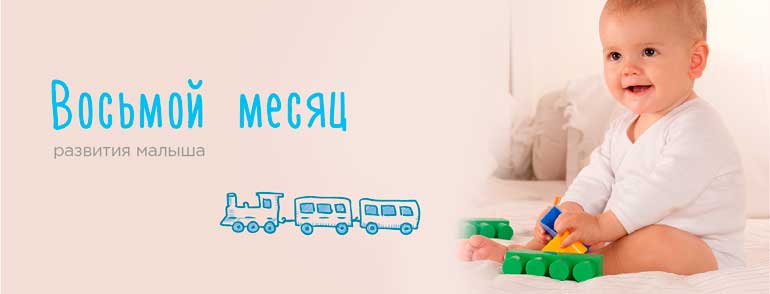
Nevertheless, the level of development of a child at 8 months may be different: someone will surprise their parents with the first word, while someone continues to utter only separate sounds, some mothers are already pleased with a smile with four teeth, while someone has not yet one. The first months of the second half of the year are the time of prerequisites and undertakings.
Physical development
The child’s growth rate is slightly reduced (as physical activity increases), in the eighth month the baby gains about 500 - 600 g and grows by 1.5 - 2 cm. By the end of the month, children gain weight up to 8 - 9 kg (± 1 kg) and height 67 - 71 cm (± 3 cm).
At 8 months, a child may already have 4 teeth: two lower and two upper central incisors. But if the crumbs do not yet have teeth, then this is also normal and should not worry parents (about teething).
What have learned
- A child from a prone position can sit down himself, and also lie back from a sitting position.
- All children know how to roll over in different directions (learn to roll over).
- It can stand, holding on to the railing of the crib and move around with it sideways, making small side steps. If you take the child by the hand, he is trying to walk.
- The kid can play "frogs", wave the handle.
- Some children may crawl well (how to teach a baby to crawl) They can also crawl while holding an object in one hand.
- Can capture small objects with two fingers.
- Perform various actions with toys: roll the ball, string rings, swing the doll.
- It can recognize itself in photographs and in the mirror.
- Shows a finger at the subject they are talking about.
- Can drink from a cupeating small pieces of food. "Treats" mom.
- Able to pull a sock off his leg.
- Do not resist when planting on the pot.
- Recognizing mom, dad, another close person among adults.
Psychological development
- The child understands your speech better and better. He can even fulfill some requests: give a ball, take a cube.
- Attachment to the mother becomes even stronger. He suffers more difficult parting, calm only next to his mother. But he makes contact faster if a stranger shows friendliness to the baby.
- The perception of loud sounds (vacuum cleaner, hair dryer) is aggravated. Many babies at this age are afraid of these devices (what to do if the child is afraid of loud sounds).
- The child not only grabs, touches and feels new objects, but also strokes them with his finger or palm.
- The kid asks with gestures to bring him to an object that interests him.He reaches for the window, the refrigerator, the cupboards and tries to open them.
- He smiles at his reflection in the mirror.
- He understands the ban, takes offense when he is strictly talked to.
- The child’s eyes are used to seeing objects from different angles. The kid learns familiar things from a distance in any location: in profile, upside down. Now the baby is clearly aware of the quality of things: color, texture, softness, shape and knows how to manipulate objects, given their properties: roll a ball, tear a piece of paper, pull a rope.
- A kid can do something on his own for more than 10 minutes. Moreover, if the child is distracted from the lesson, then after a short pause, he can remember his game and continue it.
- For a child, it becomes important to learn and achieve something, so the baby is already responding to luck and failure with joy or grief. It is very important now to praise the baby and support in your endeavors.
- May show first attempts to manipulate you. Do not follow the lead, let the baby understand what is impossible and what is possible.
- Seeks emotional contact with other children: looks at another child, smiles at him and can reach out to touch.
We read in detail: what a child can do at 8 months
Baby development test at 8 months
- When the child is lying, show him the toy at a distance, let him reach for it. The baby should be able to sit down without your help;

- In the sitting position, the baby should be able to remove the diaper with which you covered it;
- Give the child a toy and when he grabs it, try to take it away. At 8 months, the baby should show a resistance reaction: take it away, pull it toward you, push your hand away if he protests;
- Playing hide and seek, the baby laughs at your appearance;
- Recognizes familiar faces in a photograph, may name: “pa”, “ma”;
- Put a small object on the table. The kid should be able to take it with two fingers;
- A child at 8 months old begins to copy your actions: show how to roll the ball on the floor, he will try to repeat;
- Name 2 to 3 items near the child that he knows. The baby must find them with a look or show a finger.
What should alert
- The child does not sit down, does not try to get up, does not roll over, does not try to crawl;
- Cannot stand at support or with support;
- The proposed toy is missing. Does not shift the toy from one handle to another;
- Don't babble. Does not pronounce syllables;
- Does not show any emotions.
Mom Lara: Baby at 8 months. Baby development
Lure
Eating a baby at 8 months remains five times a day. Already two breastfeeds should be replaced. The first and last feedings (after sleep and before bedtime) should remain nursing. Intervals between feedings 4 - 4.5 hours.
Now you can make multi-component cereals and mashed potatoes, that is, consisting of several vegetables, fruits and cereals. At the beginning of the eighth month, you can diversify the feeding of mashed potatoes with other vegetables (zucchini, carrots, pumpkin, cauliflower) and start to give 5 grams of wheat bread. By the end of the month, dairy products are introduced: cottage cheese and kefir, if well tolerated, gradually replacing another feeding. In general, the eighth month is spent on the introduction of unfamiliar vegetables, fruits and cereals, and their assimilation in the complex. So, if you started introduce complementary foods at 6 months, then by the end of the 8th month you should have replaced three breast-feeding.
How to help your baby grow
- Keep carrying the baby in your arms. Holding (carrying on hands) remains an important element in the psychological development of the child.
- Replenish the vocabulary of the crumbs by reading books to him, talking about the world around him. Talk to the child in a gentle tone, call him by name. Attract the baby's attention to everything new. Scientists argue that the number of words that a child hears during the day directly affects the intellectual level in the future. The more you talk with the baby, the wider its potential when it grows.
Do not fuss with the child, do not distort the words, talk with the baby as a person who understands everything that you say. Even if the child says something wrong, uses the first syllable of the word, then you still speak the way you want. More often say to the baby that you love him.
Ensure safety in the house, as the child is now interested in everything and pulls it in his mouth: remove medicines and chemicals in places inaccessible to the child, install plugs in sockets, buy nozzles on corners for furniture, remove all cords and wires from the floor, rearrange from the path baby all unstable objects, put higher plants.
READ ALSO: How to secure a home for a child
Useful toys for a baby of 8 months
- Rubber balls: strengthen the ball at the baby’s feet in the crib, he will gladly kick him;
- Hammer with a squeaker: show the baby how to knock on the table. On cubes. This activity will develop coordination and strengthen the muscles of the hands;
- Continue to give the child bags or pads with fillers (peas, beans, beads) to develop fine motor skills;
- Musical toys: all children like toys with buttons, when pressed, music plays or sounds are heard. Such toys well develop logical thinking, as well as motor skills and quick wits;
- Soft textile or cardboard books: the baby can turn the pages himself;
- Games in the bath: teach your child to move toys in the water, clap a hand on the water, draw water into a mold, pour from one jar into another.
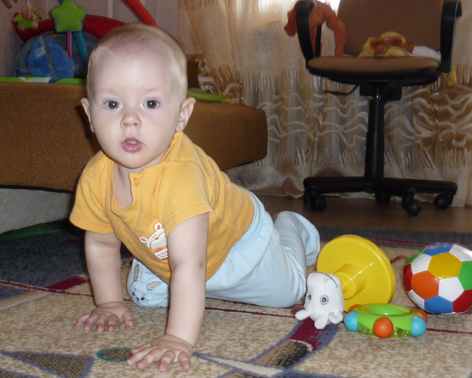
Lessons with a child at 8 months
- "Orchestra": wooden spoons or drum sticks, maracas are suitable for playing. Place pots, boxes, bowls in front of the baby and show how to hit them;
- “Repeaters”: first, the child repeats after you, you wave your hand, and he waves, you laugh and clap your hands, then he. After that, you repeat after the child;
- Build a pyramid out of cubes and show the baby how to throw the ball so that the pyramid falls apart;
- Show your child kitchen utensils: containers, spoons, pans, in general, everything that is safe. Young children love to play with items for adults;
- By nine months, you can begin to roll the ball to each other on the floor.
While bathing, gradually draw water into the bath when the child is already there, lying on his tummy. When the water is typed, the child will rise and begin to stand on all fours. Make sure that the baby does not drown in water.
"Walking on your hands": grab the child by the legs, lift and begin to gently rock back and forth. The baby will begin to rest against the handles and sort them out.
Arrange a “carousel” on the child’s arms, swing in different directions in a vertical and horizontal position. Swing with him on a swing. This is a good development of the vestibular apparatus.
A sense of balance is well developed by walkers, they can already be used. But remember that you can keep a child in them no more than 1 hour per day and no more than 15 minutes in a row, as this can adversely affect the spine and gait. (About Walkers - Pros and Cons)
Walk with your child for at least 2 hours a day. At home, continue to do daily gymnastics, arrange air baths and massage.
When you choose activities for the child, consider his preferences and temperament. At this age, children already have personality characteristics. If your baby is restless, then provide him with active games with crawling, turns and other movements. Calm children will rather enjoy looking at a book, listening to a fairy tale or building a pyramid of cubes. Respect the interests of your child, do not force him to do something, if you feel that the baby does not like it, it doesn’t work out and he reaches for something completely different.
The regimen of sleep and wakefulness remains the same as in previous months: at night, children sleep until 10 o’clock, some without even waking up. In the afternoon, two sleeps of 1.5 to 2 hours remain.
READ ALSO: daily routine of the child at 8 months
← 7 month development 9 month of development →
Mom’s school: Eighth month of life. Child Development Calendar
![]() A full calendar of the development of the child in one article “development up to a year by months” -https://kid.htgetrid.com/en/razvitie-rebenka-do-goda/razvitie-rebenka-do-goda-po-mesyatsam.html >>>
A full calendar of the development of the child in one article “development up to a year by months” -https://kid.htgetrid.com/en/razvitie-rebenka-do-goda/razvitie-rebenka-do-goda-po-mesyatsam.html >>>

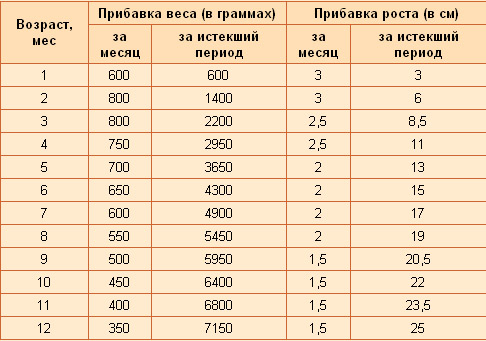


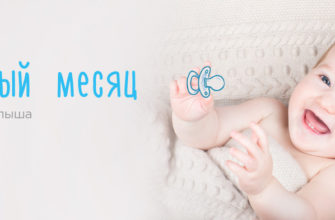


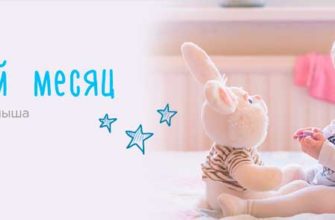


Great site! Everything is understood and accessible. It is convenient to search for the right material about daredevils. To grow and grow is a lot of work. Health to all Moms and their children.
Thank you for the wonderful site)) Very detailed and convenient. I found the answers to all my questions.
If you do everything as it is written (walk for at least 2 hours, air baths, gymnastics, games, develop, 5 meals a day, guards, bathing, etc.) then I only have time to prepare food and that's all ((((
We are 8 months old, on the summer street, we live in our house near the sea in an ecologically clean area, so we walk almost the whole day! The kid loves to crawl, walk by the handles, eats sand, plucks grass, flips the cat's bowls, feeds the dog with dryers. We gnaw books, we don’t point fingers at objects (only with a look) and we don’t take small things with 2 fingers ((So we haven’t learned everything yet.
Everything was more or less adequate until the moment with the walker ....
And the word “should” the child must really hurt the eyes ..
Arai, what else do you need? All women live like this
Kumach, women may live like that. Women live differently)
We are still 7.5 and today we first ate sand)))) In my opinion, I did not like it. We are on the willows, but also so far we don’t want to give up the mixture. We will have breakfast with porridge with fruit or vegetable puree, drink it with compote, and then we demand a mixture!)) And how can it be without boobs, I can’t imagine at all.
I don’t know, as with other readers, but in each month that is described here, the child does not do half of what the author believes. I was nervous, freaking out, and then I realized that other friends of the same age also do not do most of the above. Both at us and at them pediatricians and neurologists do not find any lag in development. At eight months, not all children get up, much less move around. Moreover, this is not a development criterion. Do not scare the already nervous moms!
Yeah, I’ve read somewhere else, I have to sing, dance. Kapets, well, who writes this. I went to 9 months is early. My child went to 7, it is very very early. The pediators looked at us with bulging eyes. when at 6 months the baby was up. And this turns out to be so! Do not worry, everything is fine with our children, this article was written by a person who is far from pediatrics. Children owe nothing! They know better at what time what to do. Do not force. For example, we still do not sit, although we already walk. And this is also a variant of the norm. And the doctors say the same thing.
This article can be used as an indicative one, since the children are all different in temperament and weight.))). For the child herself, she does not do 8 months and a half, which is described here, but I do not strain at all.
Aray and everyone who thinks the same way - you are impassable dumbasses! What else do you need time for, if the main thing now in the life of a mother is a child?
Engage relatives / friends to help.
But I’ll tell you a secret, you can do everything yourself, without any nannies. 😉
Useful article about the development of the baby. I’m interested in dealing with a child, watching how he plays, and everything has his own time :) and don’t listen to anyone, everyone has his own experience and development.It’s wildly annoying when relatives stick their nose where they don’t ask and advise: oh, put it on the pot already, oh put it on the walker for half a day ... We are only 8 months old, the baby crawls, plays, rises to the legs, independent already :) Each own experience and development :)
My son, from 6 months old, has been doing almost everything that is described in the article. Teeth from 5.5 months, 6 crawling on straight arms, not Plastunsky. After a week I got up. Now we are 7, walks by the sofa with toys in hand, runs in walkers .Weight 9.300, height 72. Mumbles on his own, knows where the chandelier, window, TV, etc. listens to books. I don’t understand mothers who are outraged in the comments below that their children owe nothing to anyone. Why do you even read these articles if your children grow and develop without relying on any standards. Articles are written for those to whom it serves as a guide to what to strive for.
Thank you very much, we can do everything, not even a little more, to Guards, refuses products, try only a little, the eldest daughter ate only guards for a year, that's normal